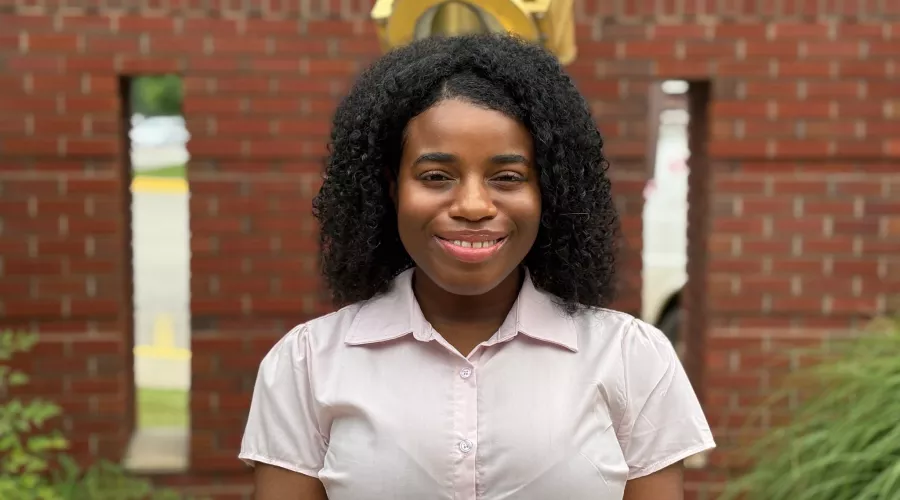From Wonder to Research: Physics Major Explores the Hidden Histories of Small Galaxies
September 3, 2025
By Stephanie Godward, Communications and Marketing Director, College of Arts & Sciences
Asaalah Muhammad’s lifelong drive to study physics and astronomy began with a sense of wonder and continues today through her curiosity-driven research.
“Just because you are older doesn’t mean you have to give up that sense of exploration and whimsy,” she states. “I have always had that sense of curiosity about the world beyond us here on earth.”
Muhammad is majoring in physics on the astronomy track and will graduate in May 2026 with a minor in Japanese language. She’s participating in the Summer Research Opportunity Program with Professor Benne Holwerda as her mentor, studying dwarf galaxies.
“We are looking at dwarf galaxies, which means a galaxy that has less than a billion solar suns worth of matter,” Holwerda said. “A small galaxy is a billion stars or less. We are trying to find out when the galaxy made those stars. The idea is that we don’t quite know when dwarf galaxies made their stars, but it seems to vary a lot.”
In this project, Muhammad compared astronomy cataloguing tools—including ones called MAGPHYS and Bagpipes—that estimate the mass of stars in small galaxies using the light they emit at different wavelengths. By analyzing results from these catalogues with Python and graphing tools, she created scatter plots and histograms to study how closely their results matched.
To make the large numbers easier to compare, she used a logarithmic scale and sorted galaxies into low-mass and high-mass categories. While reviewing the graphs, she noticed a bias: the average values from each program didn’t always line up, suggesting that the two models might calculate star mass differently. To better understand this bias, future work will include running statistical tests on the graphs and narrowing the focus to specific types of galaxies, based on their distance from Earth.
Because larger galaxies are more accessible for research, Holwerda states this is an exciting time to study dwarf galaxies.
“This is the undiscovered country for astronomy at the moment because we can see big galaxies far, far away, so we have a lot of those. So, we have studied those for longer,” Holwerda said.
The research experience has been incredibly valuable for Muhammad, who has goals of going on to graduate school for physics after graduating from UofL and eventually wants to earn a PhD.
“In research, you realize not everything is straightforward. Everything you discover, it opens a new plethora of questions – why are we getting this answer?” she said. “That is what makes it interesting because it doesn’t stop you. Once you get a result, you ask, ‘Where do we go with this?’”
In addition, SROP offers weekly seminars to support students in developing skills that will help them to be more efficient and effective as they learn to become researchers.
"The weekly seminars go over a lot of topics like time management, research ethics, and things like that. This helps to give me skills on how to manage my time well, how to interact with people I am working with in my project, and how to manage everything else around it to make sure you are at your most effective or productive,” Muhammad said.
Because she is a self-described perfectionist, learning the value of taking a break and managing time well has helped Muhammad to develop better workflows.
“I’ve learned that making a list of priorities makes what you are doing more manageable and more digestible,” she said.
In addition to gaining undergraduate research experience that she can add to her resume, which also includes completing an internship in Lexington last year, Muhammad states that it is important to her to make professional connections that could last a lifetime.
“When you go to college or you are in an academic space, it’s not just about getting grades, it is about making connections. So, I do plan on going to grad school, and by connecting with my mentor, Professor Holwerda, I have been connected to so many other people. We have weekly research meetings with grad students, other faculty members here at the university who are pursuing similar topics in physics and astronomy. I also did the Exploration of Astronomy by Kentucky Students (OAKS) project here at UofL with Holwerda, where I presented my results in poster form at the American Astronomical Society (AAS).” Muhammad said.
She encourages other physics and astronomy students to take advantage of opportunities to conduct undergraduate research.
“If you really want to pursue this, you want a solid background,” she said. “To get that solid background, I think more than taking the classes, you need to dig into it, especially because there are so many avenues in physics. You are going to want to figure out your own path. In order to know your strengths, weaknesses, and which path is right for you – do undergraduate research.”
Related News





